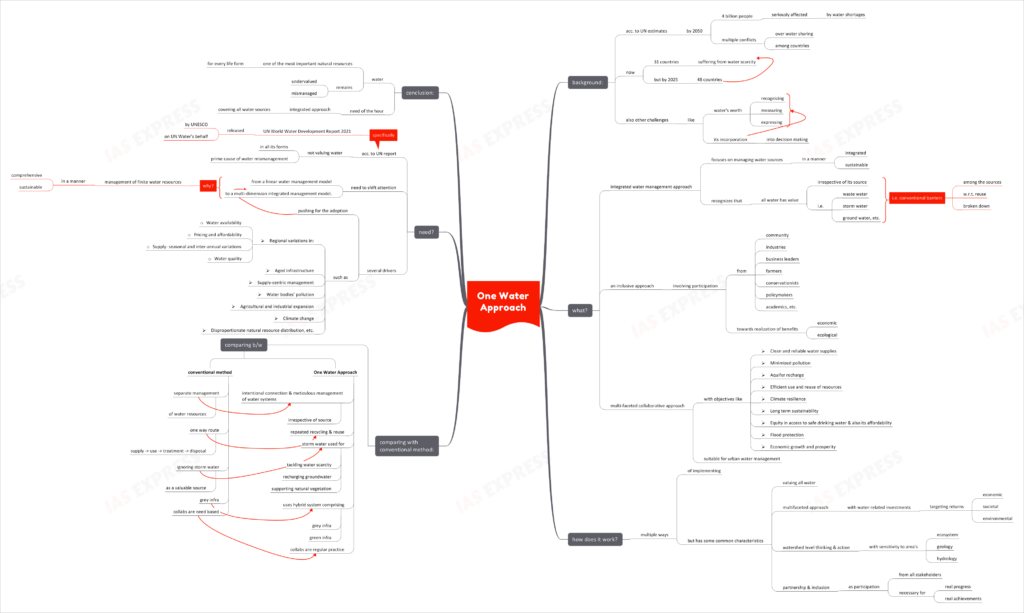One Water Approach

This topic of “One Water Approach” is important from the perspective of the UPSC IAS Examination, which falls under General Studies Portion.
Background:
- According to UN estimates, by 2050, 4 billion people may be seriously affected by water shortages, leading to multiple conflicts over water sharing among the countries.
- 31 countries are already suffering from water scarcity. This number is expected to rise to 48 countries by 2025.
- Apart from water scarcity, there are other challenges such as recognising, measuring and expressing water’s worth and its incorporation into decision making.

What is One Water Approach?
- One Water Approach is an integrated water management approach that focuses on managing water sources in an integrated and sustainable manner.
- It recognizes that all water has value– irrespective of its source– waste water, storm water, ground water, etc. i.e. the conventional barriers among these sources with regards to reuse are broken down.
- This is an inclusive approach that involves the participation from the community, industries, business leaders, farmers, conservationists, policymakers, academics, etc. towards the realization of economic and ecological benefits.
- This multi-faceted collaborative approach has several objectives, making it suitable for urban water management:
- Clean and reliable water supplies
- Minimized pollution
- Aquifer recharge
- Efficient use and reuse of resources
- Climate resilience
- Long term sustainability
- Equity in access to safe drinking water and also its affordability
- Flood protection
- Economic growth and prosperity
How does it work?
- There are multiple ways of implementing One Water Approach. However, these methods share some common characteristics:
- Valuing all water– natural water bodies, storm water, waste water, etc.
- Multifaceted approach– with water-related investments targeted at economic, societal and environmental returns
- Watershed-level thinking and action– with sensitivity to the area’s ecosystem, geology and hydrology
- Partnership and inclusion– given the fact that participation of all stakeholders is necessary for real progress and achievement.
How is it better than conventional water management approaches?
| Conventional Method | One Water Approach |
| Separate management of water resources | Intentional connection and meticulous management of water systems, regardless of their sources |
| One way route: Supply -> use -> treatment -> disposal | Repeated recycling and reuse of water |
| Ignores storm water as a valuable source | Storm water is not only used to tackle water scarcity but also to recharge groundwater and to support the natural vegetation |
| Use of grey infrastructure | Uses a hybrid system comprising a mix of grey and green infrastructure |
| Collaborations in this approach is need-based | Active collaborations with stakeholders is a regular practice |
Why is it needed?
- According to the UN World Water Development Report 2021, released by UNESCO (on UN Water’s behalf), not valuing water in all its forms is a prime cause of water mismanagement.
- There is a need to shift attention from a linear water management model to a multi-dimension integrated management model. This will enable a comprehensive and sustainable management of our finite water resources.
- There are several drivers that are pushing for the adoption of such a holistic approach:
- Regional variations in:
- Water availability
- Pricing and affordability
- Supply- seasonal and inter-annual variations
- Water quality
- Aged infrastructure
- Supply-centric management
- Water bodies’ pollution
- Agricultural and industrial expansion
- Climate change
- Disproportionate natural resource distribution, etc.
- Regional variations in:
Conclusion:
Water is one of the most important natural resources for every life form and yet, it remains undervalued and mismanaged across the world. The need of the hour is an integrated approach covering all water sources.
Practice Question for Mains:
What is One Water Approach? Why is it a better option than conventional water management model? (250 words)

